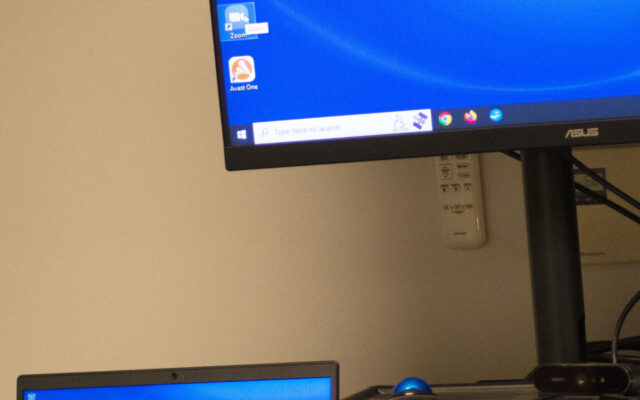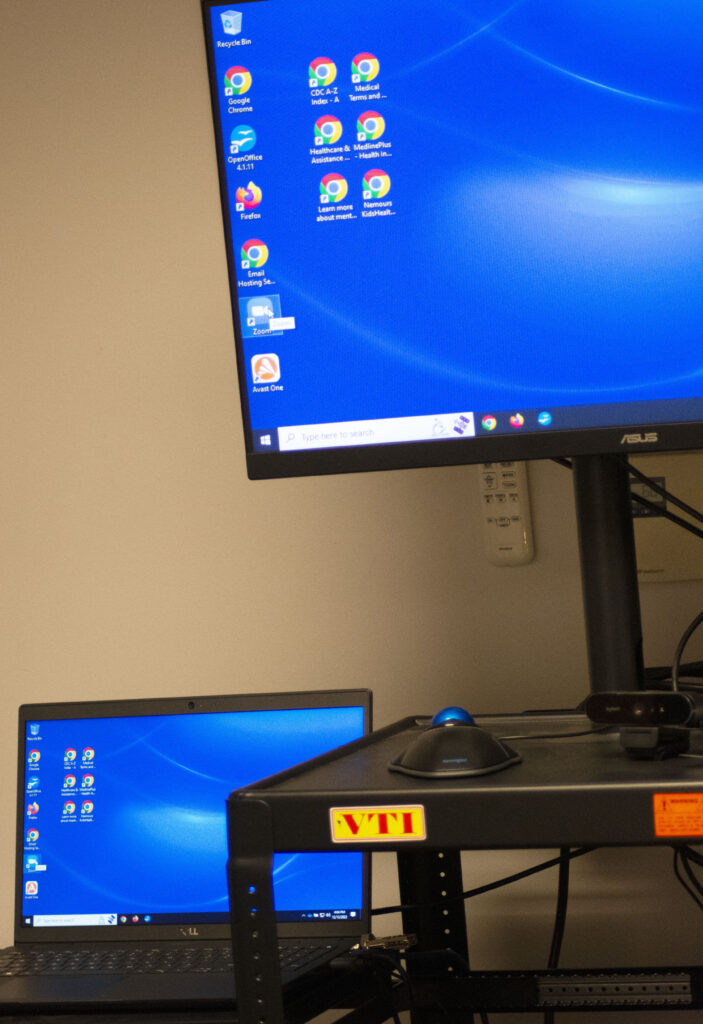
Telehealth comes to 10 rural Maine libraries
By Kathleen Phalen Tomaselli, Special to the Houlton Pioneer Times
HOULTON — A new no-cost offering at the Cary Memorial Library in Houlton makes consulting with a specialist or keeping an appointment with other health care providers in locations like Bangor or Portland just a local library visit away.
Patients set up the telehealth face-to-face appointment with their doctors and the library connects them in a sound-proofed, private room via computer and a large screen monitor at the library, said Linda Fauche, director of Cary Library.
The library’s new telehealth offering is part of the Maine State Library Health Connect pilot program available at 10 state locations: Alice L. Pendleton Library in Islesboro, Caribou Public Library, Cary Library in Houlton, Fryeburg Public Library, Henry D. Moore Library in Steuben, Paris Public Library, Peabody Memorial Library in Jonesport, Pittsfield Public Library, Skowhegan Free Public Library and Thompson Free Library in Dover-Foxcroft.
The new program allows people who live in rural areas, sometimes hundreds of miles from their doctors, to not have to travel for a consultation.

TELEHEALTH — Area residents can visit health care providers at the Cary Library through the new telehealth program that connects patients and providers via Zoom in a private, sound-proofed room in Houlton. In addition to the library-assisted Zoom connection, patients are given access to links for additional information about their health issues.
“The State Library team working on the pilot looked at communities where there was limited access to health care, including specialists,” said Marijke Visser, director of library development at the Maine State Library. Low-income levels, rural locations and higher instances of diabetes, heart disease and obesity were also considered in choosing libraries for the pilot.
Library capacity, staff availability and private meeting facilities were also among the criteria, Visser said.
The library provides a private room equipped with a laptop, camera, computer, mouse, lights, headphones and other technology relevant to telehealth needs. Types of care include wellness visits, requesting or renewing prescriptions for medications, follow-up appointments, consultations with specialists, nutritional counseling, mental health counseling and other nonurgent conditions.
Recently, Jody Wellington, telehealth librarian at Cary Library, spoke to a woman who had two doctors’ appointments — several hours away from Houlton — scheduled on the same day and she thought she would have to cancel one of the appointments. But connecting to the woman’s providers through telehealth meant she was able to keep both appointments, Wellington said.
The way it works is a person makes an appointment with a health care provider, who sets up a Zoom meeting and gives the patient the meeting number. Then the library sets up the equipment for the meeting.
The statewide program kicked off this spring. It is supported with funds awarded to the Maine State Library by the federal Institute of Museum and Library Services, as part of the American Rescue Plan Act of 2021.
So far, community usage has been slow in Houlton.
“We are finding that promoting the service takes time,” said Visser. “Of note, we have had interest from various health care providers [including Northern Light] and are hoping that having the providers also promote the service will help spread the word.”
The pilot will help the state library learn more about what works and what needs tweaking. Visser said the program could add locations or continue to work with the 10 established to understand more about the needs and whether different technology is required to enhance the program.
“In general we are pleased,” she said. “As a pilot, we’re looking at this as a learning opportunity, what works and what doesn’t. We look at telehealth through libraries as one more way libraries are able to meet the needs of their communities, especially in our more rural and remote areas where services can be lacking.”